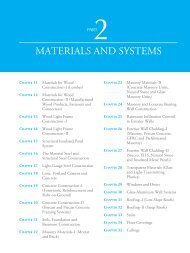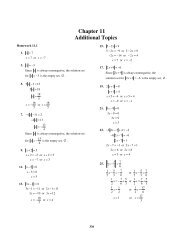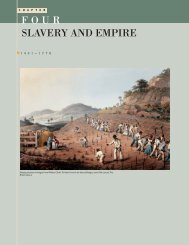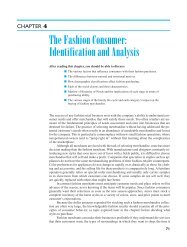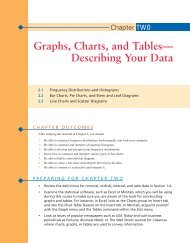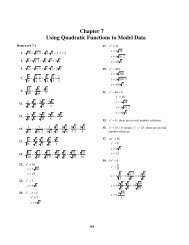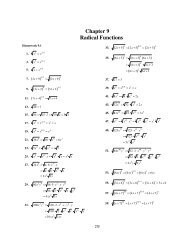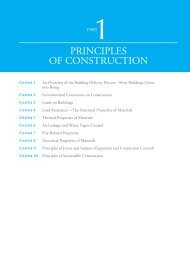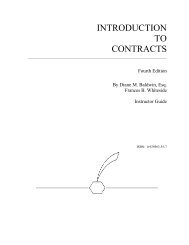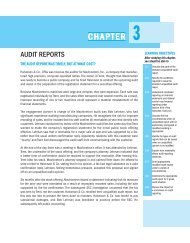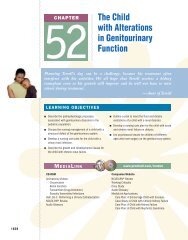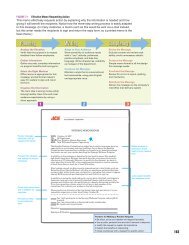audit reports
audit reports
audit reports
You also want an ePaper? Increase the reach of your titles
YUMPU automatically turns print PDFs into web optimized ePapers that Google loves.
of the other <strong>audit</strong>or. The principal <strong>audit</strong>or may also decide that a qualification is<br />
required in the overall report if the other <strong>audit</strong>or qualified his or her portion of the<br />
<strong>audit</strong>. Qualified opinions and disclaimers are discussed in a later section.<br />
DEPARTURES FROM AN UNQUALIFIED AUDIT REPORT<br />
It is essential that <strong>audit</strong>ors and readers of <strong>audit</strong> <strong>reports</strong> understand the circumstances<br />
when an unqualified report is inappropriate and the type of <strong>audit</strong> report issued in each<br />
circumstance. In the study of <strong>audit</strong> <strong>reports</strong> that depart from an unqualified report,<br />
there are three closely related topics: the conditions requiring a departure from an<br />
unqualified opinion, the types of opinions other than unqualified, and materiality.<br />
First, the three conditions requiring a departure are briefly summarized. Each is<br />
discussed in greater depth later in the chapter.<br />
1. The Scope of the Audit Has Been Restricted (Scope Limitation) When the <strong>audit</strong>or<br />
has not accumulated sufficient evidence to conclude whether financial statements are<br />
stated in accordance with GAAP, a scope restriction exists. There are two major causes<br />
of scope restrictions: restrictions imposed by the client and those caused by circum -<br />
stances beyond either the client’s or <strong>audit</strong>or’s control. An example of a client restriction<br />
is management’s refusal to permit the <strong>audit</strong>or to confirm material receivables or to<br />
physically examine inventory. An example of a restriction caused by circumstances is<br />
when the engagement is not agreed on until after the client’s year-end. It may not be<br />
possible to physically observe inventories, confirm receivables, or perform other<br />
important procedures after the balance sheet date.<br />
2. The Financial Statements Have Not Been Prepared in Accordance with Generally<br />
Accepted Accounting Principles (GAAP Departure) For example, if the client insists on<br />
using replacement costs for fixed assets or values inventory at selling price rather than<br />
historical cost, a departure from the unqualified report is required. When generally<br />
accepted accounting principles are referred to in this context, consideration of the adequacy<br />
of all informative disclosures, including footnotes, is especially important.<br />
3. The Auditor Is Not Independent Independence ordinarily is determined by Rule 101<br />
of the rules of the Code of Professional Conduct. Auditor independence requirements<br />
and the Code of Professional Conduct are further discussed in Chapter 4.<br />
When any of the three conditions requiring a departure from an unqualified report<br />
exists and is material, a report other than an unqualified report must be issued. Three<br />
main types of <strong>audit</strong> <strong>reports</strong> are issued under these conditions: qualified opinion,<br />
adverse opinion, and disclaimer of opinion.<br />
OBJECTIVE 3-5<br />
Identify the types of <strong>audit</strong> <strong>reports</strong><br />
that can be issued when an<br />
unqualified opinion is not justified.<br />
A qualified opinion report can result from a limitation on the scope of the <strong>audit</strong> or<br />
failure to follow generally accepted accounting principles. A qualified opinion report<br />
can be used only when the <strong>audit</strong>or concludes that the overall financial statements are<br />
fairly stated. A disclaimer or an adverse report must be used if the <strong>audit</strong>or believes that<br />
the condition being reported on is highly material. Therefore, the qualified opinion is<br />
considered the least severe type of departure from an unqualified report.<br />
A qualified report can take the form of a qualification of both the scope and the<br />
opinion or of the opinion alone. A scope and opinion qualification can be issued only<br />
when the <strong>audit</strong>or has been unable to accumulate all of the evidence required by generally<br />
accepted <strong>audit</strong>ing standards. Therefore, this type of qualification is used when the<br />
<strong>audit</strong>or’s scope has been restricted by the client or when circumstances exist that prevent<br />
the <strong>audit</strong>or from conducting a complete <strong>audit</strong>. The use of a qualification of the<br />
opinion alone is restricted to situations in which the financial statements are not stated<br />
in accordance with GAAP.<br />
Qualified Opinion<br />
CHAPTER 3 / AUDIT REPORTS 55



